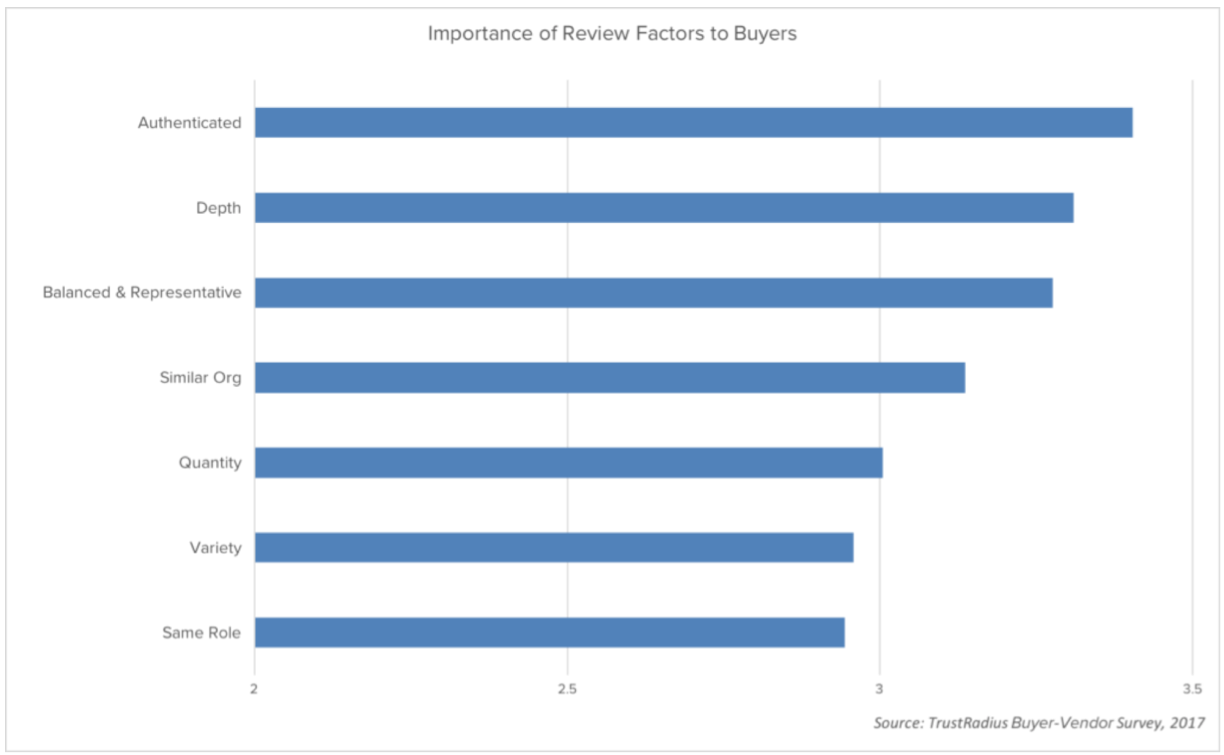Christian Golden discusses why customer reviews are an important part of a marketing strategy and how their potential can be harnessed. His article is based around in-depth research into what buyers of B2B software look for on their purchasing journey – a study which revealed some major trust issues and the increasing need for vendor transparency.
It’s natural for tech vendors to ask why they should invest resources in user reviews of their products. The answer is simple – customers care! We will be taking a look at some of the main reasons why buyer reviews matter, how and when buyers use them, and addressing some common concerns about how vendors can best get and use them, too.
Winning the crowd
Buyers show a growing tendency to conduct their own product research. But though many still rely on vendors for information, the majority of them are sceptical of claims vendors make on their own behalf. Buyers have more confidence that demos, trials and reviews by other users will provide the most complete and realistic product information.
A 2018 study by TrustRadius, which sheds light on the B2B purchasing process by surveying more than 650 business technology vendors and buyers, finds evidence of a substantial trust gap between the two groups.
For instance, while nearly nine out of ten (85%) vendors believe they accurately represent their own products’ limitations, only about one in three (37%) buyers share this favourable view. And though roughly three in four (77%) buyers say their vendor had little influence over their purchasing decisions, those vendors who promote their products candidly, with unbiased customer feedback, are twice as likely to strongly influence customers’ purchasing behaviour.
The evidence is in: buyers want reviews and vendors have everything to gain by meeting the demand.
What buyers want (to know)
Companies looking to optimise their use of customer reviews will want to know how buyers behave, what they want and how reviews typically contribute to their product selection. Two questions in particular arise.
First, how do reviews fare by comparison with other sources of information in the average buyer selection process?
The answer varies somewhat based on the size of the buyer’s company, in this ascending order: enterprises (42%), small businesses (50%) and mid-sized companies (53%). Still, among commonly used sources, reviews rank fourth overall, right alongside actually testing the product via free trial.
And we know something about which buyers read reviews within companies. On TrustRadius, a third-party review site, 6-10% of those registered to read reviews are high-ranking executives, a crucial audience for marketers. And 24% of buyers who use TrustRadius to look at reviews describe themselves as the lead buyer.
This means that those who use TrustRadius and similar sites do not always make the final decision to buy. The average user surveys, researches and trials options, often directly interacting with vendors, to inform their selections. In the end, users across roles and departments play different but essential roles in the purchasing process.
Second, what do buyers look for when they use reviews to guide their purchasing decisions?
A 2017 buyer-vendor survey by TrustRadius used a scale of 1 to 4 when asking users of reviews to rate the importance of seven qualities of reviews and review sites:
- Authentication of reviewer
- Review depth of insight
- Accuracy of review’s representation of overall customer attitudes
- Similarity of reviewing organisation to buyer’s own
- Quantity of available reviews (for products of interest)
- Variety of perspectives in available reviews
- Reviews written by users in same role as buyer

Vendors should note which factors buyers rated as the most important to them: authentication of reviewers, verifying that they are real people via professional profiles like those on LinkedIn (#1); a review or site’s depth of analysis (#2); and balance or overall absence of bias in a set of customer reviews (#3).
The clear pattern suggests that users put great stock in the substance and reliability of reviewer feedback. Again, trust – both buyer-buyer and buyer-vendor, which are closely connected here – emerges as key.
In short, B2B buyers want to thoroughly understand a product before they commit to it. Importantly, they tend not to trust vendors to provide a warts-and-all picture. As a result, buyers turn to end-users and third-party reviews for the straight dope. And, according to a recent survey, nearly nine out of ten buyers actively sought negative feedback about products to balance out the positive customer reviews.
Customer reviews: action items for vendors
We saw earlier that third-party platforms offer resources and an accessible platform for tech vendors who want to invite patrons to weigh in on their products. This provides benefits to the universe of buyers, but it helps companies, too, since they gain valuable insight about areas for possible improvement in their products and services.
There are many steps vendors can take to harness the potential of customer reviews. Here are three that correspond to what studies have shown buyers most value in customer reviews:
- Take care in selecting the right B2B review site for hosting reviews of your products. Remember that readers assign a high priority to authenticity. Third-party validation of the claims in your marketing materials goes a long way towards earning their confidence. Sites that moderate and authenticate the customer reviews they receive, and carefully observe FTC guidelines, are your best bet.
- Remember that depth of analysis is among the most important things buyers hope to find in reviews. One way to provide it is to pick a third-party platform on which to concentrate your energy. Potential buyers will be reassured by a concerted effort to amplify, listen to and engage with their honest responses.
- Finally, seek reviews from a range of viewpoints across different departments and roles. Invite program managers, IT folks, consultants, executives and end-users to review your products. A robust assortment of perspectives in your review base not only meets buyers’ demands for variety, but fits the current trend in B2B technology toward more collaborative decision-making in buyer committees.
‘Trust but verify’ has become the B2B buyer’s mantra. By using reviews to meet the demand for trustworthy information about their products, vendors can help build confidence in their brand, laying the foundation for competitive success.
Have an opinion on this article? Please join in the discussion: the GMA is a community of data driven marketers and YOUR opinion counts.






Leave your thoughts